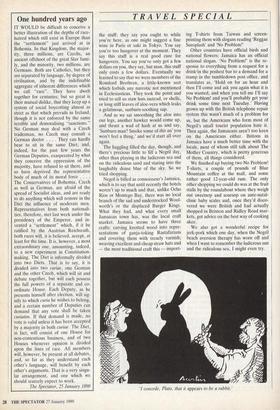One hundred years ago
IT WOULD be difficult to conceive a better illustration of the depths of race- hatred which still exist in Europe than the "settlement" just arrived at in Bohemia. In that Kingdom, the major- ity, three millions, are Czechs, an ancient offshoot of the great Slav fami- ly, and the minority, two millions, are Germans. Both are Catholics, but they are separated by language, by degree of civilisation, and by the indefinable aggregate of inherent differences which we call "race". They have dwelt together for centuries; but so great is their mutual dislike, that they keep up a system of social boycotting almost as strict as that which prevails in Ireland, though it is not enforced by the same terrible and demoralising "sanctions." No German may deal with a Czech tradesman, no Czech may consult a German doctor . . . . They can hardly bear to sit in the same Diet; and, indeed, for the past few years the German Deputies, exasperated by what they conceive the oppression of the majority, have refused to sit there, and so have deprived the representative body of much of its moral force . . . . The Conservatives of Bohemia, Czech as well as German, are afraid of the spread of Socialist ideas, and are ready to do anything which will restore in the Diet the influence of moderate men. Representatives from both nationali- ties, therefore, met last week under the presidency of the Emperor, and in- vented a "settlement" which, if it be ratified by the Austrian Reichsrath, both races will, it is believed, accept, at least for the time. It is, however, a most extraordinary one, amounting, indeed, to a new experiment in Constitution- making. The Diet is informally divided into two Diets. That is to say, it is divided into two curiae, one German and the other Czech, which will sit and debate together, but will each possess the full powers of a separate and co- ordinate House. Each Deputy, as he presents himself after election, will sig- nify to which curia he wishes to belong, and a certain number of Deputies can demand that any vote shall be taken curiatim. If that demand is made, no vote is valid unless it has been accepted by a majority in both curiae. The Diet, in fact, will consist of one House for non-contentious business, and of two Houses whenever opinion is divided
upon the lines of race. All members will, however, be present at all debates, and, so far as they understand each other's language, will benefit by each other's arguments. That is a very singu- lar arrangement, and one which we should scarcely expect to work.
The Spectator, 25 January 1890


























































 Previous page
Previous page